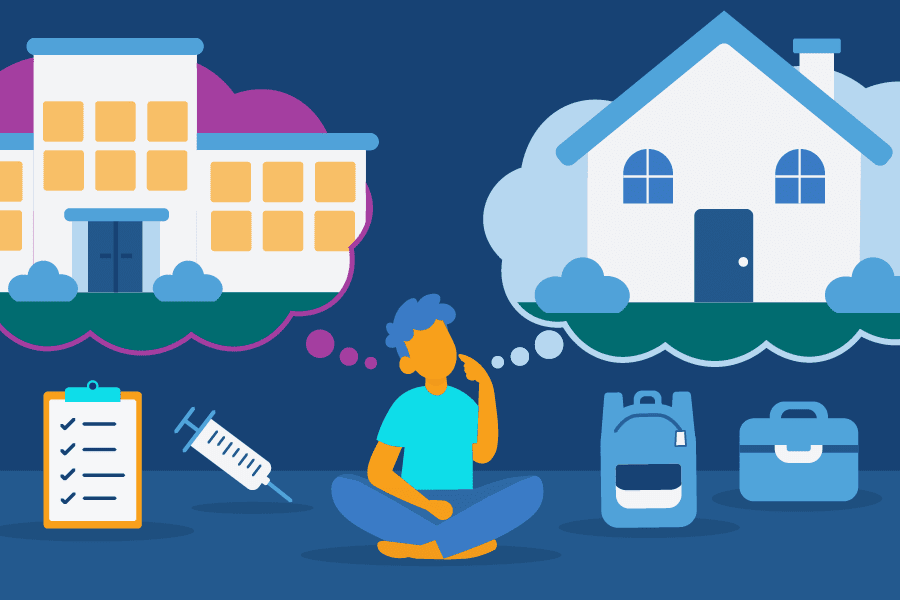What is Cognitive Behavioral Therapy?
Cognitive behavioral therapy (CBT) focuses on the relationship between thoughts, feelings and behaviors. It helps people to identify unhealthy thought patterns, and how these may be contributing to destructive behaviors and beliefs. There are a variety of therapies that fit under this general umbrella, including Rational Behavior Therapy, Rational Emotive Behavior Therapy, and Cognitive Therapy.
The core objective of CBT is to identify false or negative beliefs, and restructure them to more closely reflect reality and/or experience. For example, the thought “I can never get anything right,” might be replaced with the thought, “Based on prior experience, most of the time I am able to do things well.”
CBT also focuses on building skills and learning new techniques and concepts. It is a time-limited form of therapy—eventually a person learns to apply these skills and concepts themselves, and no longer need the help of a therapist.
There is a significant body of research supporting the efficacy of cognitive behavioral therapy in addressing a variety of mental health challenges, including substance use, depression, anxiety, and schizophrenia.
CBT for Substance Abuse
The National Institute on Drug Abuse (NIDA) recognizes CBT as an evidence-based practice for treating substance abuse, including alcohol, cocaine, methamphetamine, marijuana, and nicotine. CBT has been shown to be effective in treating substance abuse by a great number of studies. CBT includes a wide range of interventions:
- Functional analysis – what purpose does use serve?
- Behavioral strategies to avoid triggers
- Building problem-solving skills
- Drug refusal skills
- Coping skills
- Increased self-awareness and self-monitoring to identify early warning signs
- Exploring the positives and negatives of continued use vs. reduced or use or abstinence
- Anticipating likely problems and how they can be addressed
Long-term substance abuse often decreases a person’s available coping mechanisms, as it becomes the go-to anytime that the person is sad, happy, angry, bored, etc. CBT for substance abuse especially focuses on unlearning old, unhealthy behaviors and coping mechanisms, and learning new ways of coping.
CBT for Dual Diagnosis
The majority of people struggling with substance abuse also struggle with a co-occurring disorder such as depression or anxiety. All these conditions can create a distortion in thinking. This distorted thinking can be both the cause and the effect of the mental illness or substance abuse.
For example negative, unrealistic thought patterns can lead to hopelessness, and chronic depression can lead someone to consistently see the world through a hopeless lens, leading them to believe these thoughts are reality.
Learning to recognize thinking errors and distorted thoughts is an important tool in addressing a variety of co-occurring disorders as well as substance abuse.
How Sandstone Care Uses CBT
Sandstone Care’s adolescent and young adult treatment programs for substance abuse and co-occurring disorders use CBT as one tool in a comprehensive and integrated approach that includes community reinforcement, family therapy, psychiatric support, nutrition, exercise, academic and vocational support, and if appropriate, sober living.
We believe that it is important to treat the system in a holistic way. CBT is one part of this approach.
Sandstone Care clients participate in group and individual CBT sessions. They practice the skills they are learning with other group members, their therapist, and also in the “real world.”
This is one of the benefits of outpatient treatment—clients have an opportunity to get real time feedback from family members, employers, and peers how their new skills and insight are impacting those around them.
As they become more confident with the skills and concepts of CBT, they have the opportunity to teach and mentor newer clients, further solidifying their own understanding and integration.
At Sandstone Care, we individualize our treatment approach to best fit the needs of each client because each client is unique. If you or your loved one is struggling with substance abuse or addiction or a co-occurring disorder, we can help. Sandstone Care treats adolescents and young adults struggling with substance abuse and co-occurring disorders.






